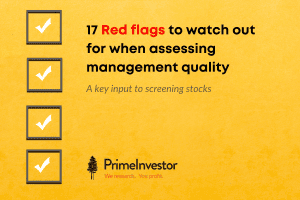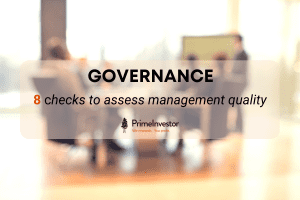
17 Red flags to watch out for when assessing management quality
Assessing management quality is a key input to screening stocks and R Balakrishnan gives us some red flags to watch out for while doing this.

Assessing management quality is a key input to screening stocks and R Balakrishnan gives us some red flags to watch out for while doing this.

What stock markets should be assessed on, where markets stand now, and other observations.

SEBI (Securities Exchange Board of India) has levelled charges of front-running against two big institutions that may Indians are invested with – LIC and Axis Mutual Fund. Front running and its close cousin – insider trading – were quite widely prevalent in the days of yore, before SEBI drafted elaborate regulations to keep such practices at bay. But what do today’s investors need to know about these malpractices? Here’s an explainer.

The recent furore surrounding the failure of Silicon Valley Bank in the US has exposed that while banking is a favourite sector with stock market investors, the fragility of the banking business is far from well-understood. Banks are held up as the engines of economic growth. Whichever sector grows, the banking sector ultimately gains. Banks are also accorded a higher valuation than most sectors during bull phases. In good times, banks made up a 40% plus weight in our leading stock market indices.

The Adani saga (still continuing, I guess) brings forth the issue of governance, management quality, and other qualitative factors that many investors consider as essential check boxes. During the time I spent in CRISIL, ‘management quality’ would set a cap on ratings. But what is ‘management quality’?

There are more theories on what works in stock investing than there are listed stocks. Each one seems to be successful at some point in time. However, there is still no single universally applicable formula. I am still in search of that magic formula. If any of you do find one, please post it in the comments section.
But if there can be said to be two warring camps on the right approach to stock investing, these are usually fundamental analysis and technical analysis. Both have loyal camps of followers who swear that their method works best.

Low interest rates and rising inflation are a dilemma for savers. There is a constant conflict between risk and return. As far as the retail investor is concerned, he looks forward to being ‘protected’ by the regulators. Financial literacy does not come easy and ninety percent of us would not know the difference between a fixed deposit and a debenture. And we would be forgiven in thinking that the term ‘secured’ debenture or bond means that every rupee we invest is safe! But where should we draw the line in the search for high interest rates?

For investors who can write a single cheque of Rs 50 lakh or more, Portfolio Management Services (PMS) have emerged a popular vehicle for investment into equities. In effect, PMS is identical to investing directly in shares, the main difference being that you have given absolute power to the PMS agency to buy/sell shares on your behalf and your portfolio choices are left to them.

Today, everyone seems to be part of Whatsapp groups, Telegram channels etc which specialize in giving stock tips. As an individual, it is an extremely demanding ask to keep searching for new stocks, new ideas etc. There is a constant bombardment of ideas and stock tips from the media- television channels, internet business websites, free data providers, charts, tipsheets and more.

Small caps are always alluring to the investor. Everyone knows that it is difficult to make quick money in large well-known and well-researched stocks. We all want to find that small gem which turns a lakh of rupees into crores. The most money is made in such cases when we can spot a company that will turn out to be a market-leading name in five to ten years. Today, the investor population has increased dramatically. Besides, information is available to everyone. This makes small cap investing both interesting and risky.

Indian investors can pay dearly if they choose to ignore regulatory risk. The risk of a regulator suddenly putting a spoke in the wheel of a sector or company that’s sailing along, cannot be quantified. It is a subjective assessment.

As per the above table, we are not yet in a bear market, though it would seem to be just round the corner. But what the data shows is that the period taken to recover from the onset of a bear market back to regaining the previous peaks can be as short as three months or as long as 74 months.
Hold On
You are being redirected to another page,